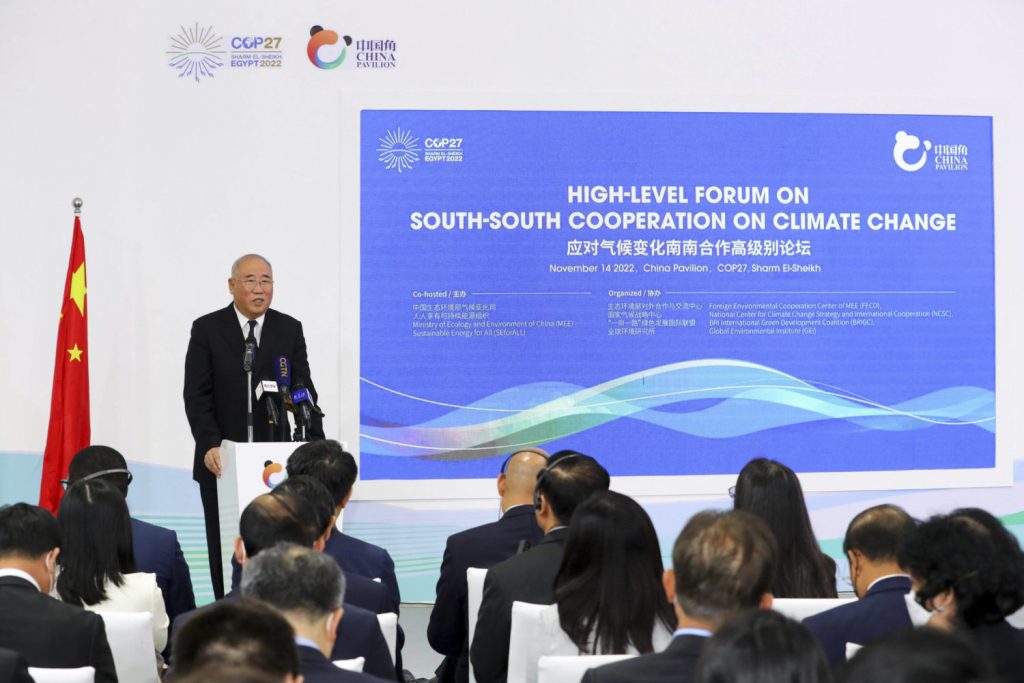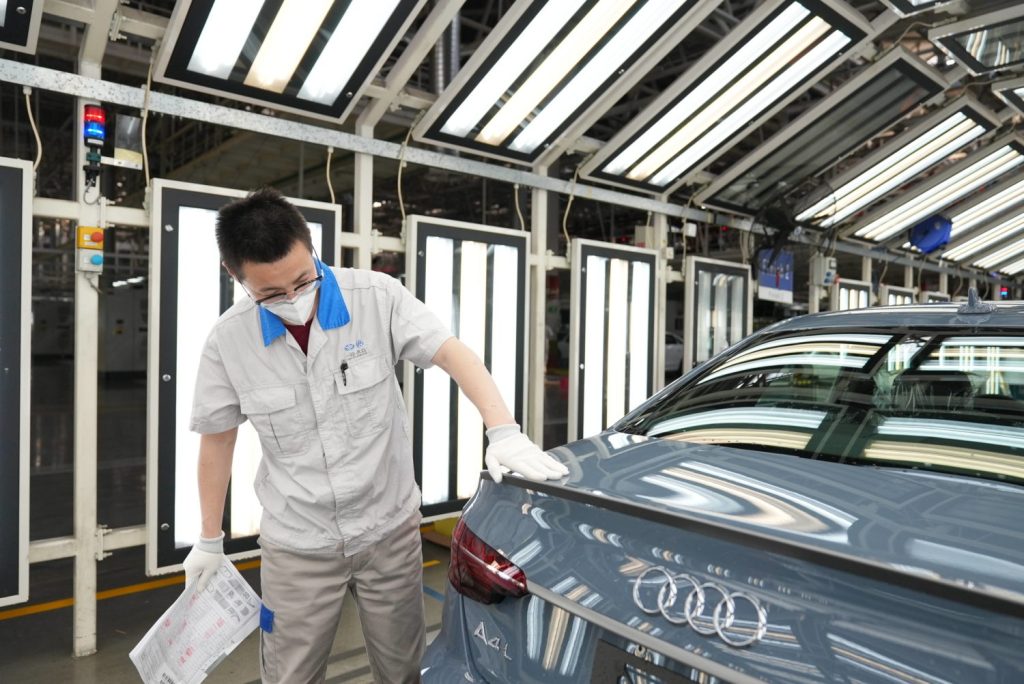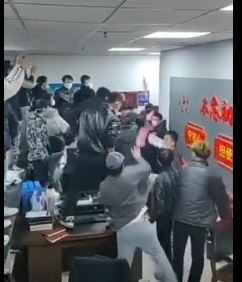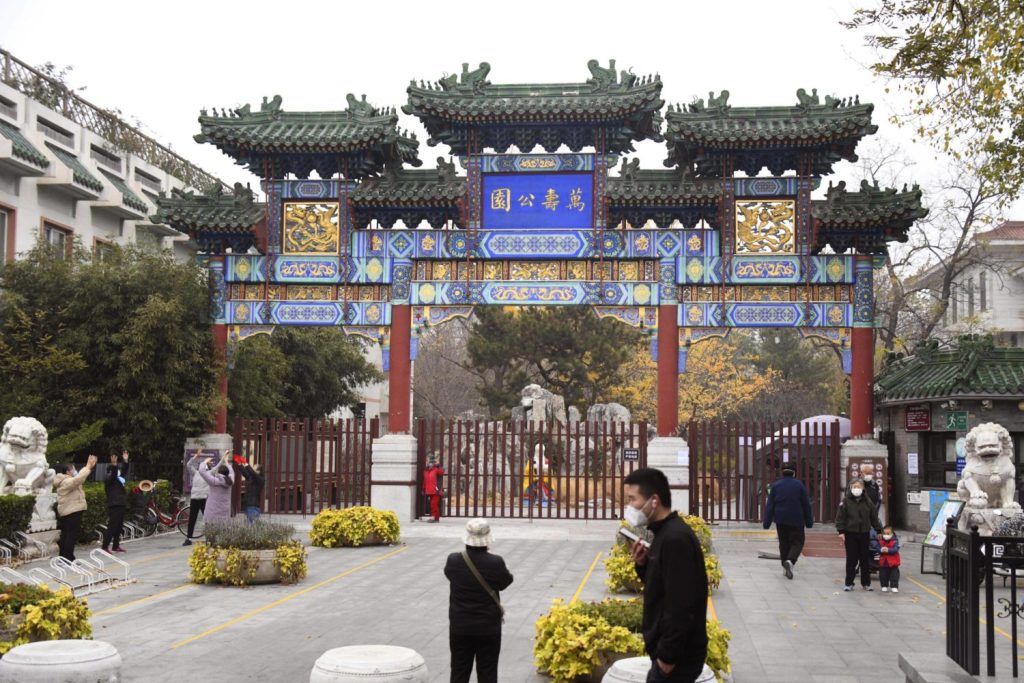It cannot be said that China has not done anything about climate protection. No other country has invested as much in wind power and solar energy in recent years as the People’s Republic. The overall assessment of China’s role at the COP27, which ended last weekend, is nevertheless sobering. That is because China continues to refuse to pay into the climate aid fund for developing countries – and even as a feared economic superpower still somehow considers itself a developing country. But the debate over China’s status is not over, writes Christiane Kuehl in her analysis. On the contrary: It is in full swing and will likely be back at the top of the agenda at next year’s COP in Dubai.
Things are not looking rosy for the German automotive industry in China either. The more EVs are sold on the world’s largest car market, the smaller the market share of German carmakers is. Volkswagen in particular struggles to keep up with its Chinese EV competitors. A lose-lose situation seems to emerge, according to a study by the Berlin-based China Research Institute Merics, which our author Christian Domke Seidel has taken a closer look at. If German automakers continue to rely heavily on China, they are taking a geopolitical risk. If they cut back their investments in the Middle Kingdom, they risk being left behind by the Chinese competition and Tesla.
Today’s “China Perspective” column looks at a completely different kind of impossible way out. The family and social pressure on lesbians and gays not to be married weighs heavily on them. That is why many of them resort to fake marriages. But this creates other problems. The obvious solution would be same-sex marriage. But under Xi Jinping, China is further away from this than ever.


Shortly after the start of the conference, Gaston Browne, chairman of the Aosis Group of vulnerable island states, caused the first stir. He demanded that China too should contribute to the financing of climate policy. Coming from a member of the China-dominated G77 group of 134 developing countries, that was quite a statement. Browne had to row back, but the signal was sent (Climate.Table reported). China’s negotiator Xie Zhenhua then quickly clarified that his country would support a mechanism for compensation payments for damage in poor countries – but by no means financially (China.Table reported).
But Xie was unable to put a stop to the debate behind the scenes about whether China, as an ambitious superpower, can continue to avoid any commitments to finance climate aid in the long term. It became one of the central discussions at COP27, which ended Sunday, and the debate over China’s status is not over. It will continue at COP28 in Dubai in November 2023.
Speaking to China.Table on the sidelines of the China Time conference in Hamburg on Wednesday, German negotiator, State Secretary and Special Envoy for International Climate Action, Jennifer Morgan, called the EU’s sudden push for a climate damage compensation fund for the poorest countries “one of the most important moments of COP.” It was very important that there was “a crack in the wall between developed and developing countries” in Sharm el Sheikh by deciding on a loss and damage fund, said Morgan, who together with Chilean Environment Minister Maisa Rojas acted as “facilitators” to mediate in this difficult area. “That alone made it worth doing.”
In the end, the EU prevailed in tough negotiations to pay out the fund’s money only to particularly vulnerable developing countries. However, Brussels and its allies were forced to abandon the desired expansion of donor countries to include countries such as China and the Gulf states. In the final document of COP27, the wording does not rule out an expansion of benefactors. It is now up to a transition committee to propose new funding sources for loss & damage. (Climate.Table reported).
China already knows it needs to do more, said Morgan, who also spoke at COP27 with China’s climate czar Xie Zhenhua, whom she has known for many years. “I have a good working relationship with Xie Zhenhua,” Morgan said at a panel discussion at the conference. “We may not always agree. But we can tell each other that.” The seasoned Xie is well-respected internationally, and US climate negotiator John Kerry is also said to get along well with him.
Like Kerry, Xie largely went unnoticed at this COP. What attracted the most attention was his promise that China was working on a methane plan that would also become part of the long-term climate targets. The greenhouse effect of methane is four times greater than that of carbon dioxide, and in China, it emanates from wet rice fields, among other sources. Previously, China only worked with carbon reduction targets. “You can tell from this that there is movement,” Morgan said.
Officially, however, China maintains its line. The industrialized countries have “developed countries have still not fulfilled their commitment to providing 100 billion US dollars in climate finance to developing countries every year,” foreign office spokeswoman Mao Ning said on Monday after the conclusion of COP – as if the debate about China’s role in this financing had never existed.
China also emits more greenhouse gases than any other country in the world due to its size, around 30 percent of global emissions. Per capita, each Chinese emits about 7 tons of carbon dioxide per year, said renowned climate expert Mojib Latif at the China Time conference. Every German emits 9 tons a year, every Indian only 2 tons. So China closes the gap to industrialized countries, and that includes cumulative, so-called “historical emissions” – which are so important because carbon dioxide remains in the atmosphere for centuries. “The US has emitted the most cumulatively, with a 20 percent share,” Latif said. “But China is already number 2, with 11 percent.” All of this further weakens China’s developing country argument.
China wants to be carbon-neutral by 2060 – its target date lies between most industrialized countries (2050) and developing countries such as India (2070). China’s emissions are to fall by 2030 at the latest. However, China did not specify the amount that will be blown into the air by then. However, many experts believe that China’s emissions could peak earlier and are urging Beijing to be more ambitious.
Typically, China promises too little and then over-delivers, said climate expert Liu Hongqiao at the China.Time conference in Hamburg. Liu has been reporting on China’s climate policy for ten years, among others, for the specialist service Carbon Brief. China will not issue a more ambitious target until it is absolutely certain it has passed its emissions peak. “Then they might do a new calculation.”
It’s an approach that does not fit into the world of climate COPs, which envision ever-increasing commitments – and strive for as much transparency as possible. China’s system lacks transparency, Jacob Werksman of the EU Commission’s Directorate-General for Climate Action pointed out at the conference: “That makes it hard to see China’s climate action and be inspired by it.”
The People’s Republic certainly sees itself as a state that helps others with climate protection – and also does a lot to counter the climate crisis. China owns almost 40 percent of global wind energy capacity and 33 percent of global photovoltaic capacity, China’s Consul General in Hamburg Cong Wu emphasized at the China.Time conference. Beijing promotes South-South cooperation and helps developing countries through greener projects in the Silk Road Initiative (“Green BRI”) and its new Global Development Initiative.
So what is next? “We will try to get China out of the political framing it has been hiding behind for 30 years,” Werksman said. Beijing used its 1992 classification as a developing country to avoid responsibility. “But now after COP27, it’s becoming more visible and more apparent that this is no longer possible,” Jennifer Morgan said. And it is a bit like soccer: After COP is before COP.

Unconditional support seems to have been replaced by healthy skepticism. For a long time, the German government strongly supported the economic activities of German automakers in China. Members of the brands’ executive boards regularly accompanied politicians on their trips to the People’s Republic.
But between politicians and corporate headquarters, the ideas of the best course for the auto industry are increasingly diverging. This has become clear in recent weeks. In its strategy paper, the German Foreign Office emphasizes the reduction of risky dependencies (China.Table reported). Meanwhile, the Ministry of Economics does not wait for the strategy and is already creating facts. It is cutting back its support for business in China (China.Table reported). In contrast, Ralf Brandstaetter, Volkswagen’s Head of China Operations, wants to invest even more than before in China to maintain market share. Clearly, this no longer fits together.
The position of politicians is now supported by a study by the China research institute Merics. The experts at Merics emphasize that the government and manufacturers have the same goal: the long-term success of German automakers. But the fact that this can be achieved with higher investments in China is by no means certain, they say. And that is because of the mobility transformation.
According to Merics, the big problem is that the Chinese economy benefits much more than the German economy from the continued involvement of German automakers. This has three reasons.
But even if all these problems are solved, the continued success of German manufacturers in China is not a foregone conclusion, despite billions of dollars in investment. Merics calculates that the market share of German manufacturers in the Chinese new car market dropped by 24 percent in January to May 2022 alone.
The more EVs sold, the smaller the market share of German companies is. Only four of the top 15 EV manufacturers are not entirely Chinese. Namely, in second place SAIC-GM-Wuling (9.6 percent market share) and Tesla (7.0 percent) in third place. With SAIC-VW (1.8 percent) and FAW-VW (1.6 percent), Volkswagen finds itself in 14th and 15th place. With a market share of 29.3 percent, market leader BYD leads the ranking unchallenged.
Merics believes that German brands are trying to compensate for their weaknesses with joint ventures and partnerships. BMW, Mercedes and Volkswagen, for example, are cooperating with Baidu. The Germans are also courting the rest of the who’s who of Chinese tech giants, from Alibaba to Tencent to Xiaomi. Through these investments, the brands hope to gain access to the EV value chain, which Chinese companies currently dominate. Be it the battery, semiconductors or software.
Merics points out that these investments could help German manufacturers avoid falling behind on the global automotive market. On the one hand, with new technologies, and on the other, with market access. Less committed companies could quickly lose the latter in the event of geopolitical tensions. But this is also precisely a question of political convictions.
Before the Russian attack on Ukraine, Renault sold 18 percent of its cars in Russia. As a result of the sanctions, the brand had to sell its business to the Russian manufacturer Avtovaz for a symbolic euro. Such scenarios could theoretically happen in China as well, Merics elaborates. Added to this are economic policy considerations. After all, high spending on research and development also benefits Chinese partners.
Furthermore, it is far from certain that research results achieved in China – for example in the field of artificial intelligence or autonomous driving – can be used outside the country at all. The People’s Republic has strict rules regarding the export of technology and the cross-border transfer of data. Already, profits made by German manufacturers in China often stay there as reinvestment, because transferring them to Germany is not as easy. That, at least, is a glimmer of hope. Because the reverse is true. If the investments of German brands dry up, this primarily harms the Chinese economy.
Tuesday, Nov. 29, 2022; 11-11:45 a.m. (US time)
CSIS / hybrid event Assessing the 2022 G20 Summit: The Sherpa Perspective on Bali Outcomes More
Nov. 30, 2022; 3-4 p.m. China Time
Dezan Shira / Webinar Cybersecurity – Regulatory Framework & Compliance Requirements in 2022 More
Dec. 01, 2022; 9-10 a.m. CET
Merics / Online Event Can China escape from its Zero Covid trap? More
Dec. 1-2, 2022; Shanghai
Conference Automotive Safety Summit More
Apple contract manufacturer Foxconn apologized to workers at its Zhengzhou factory after violent clashes in recent days. On Thursday, Foxconn said a technical error had caused workers to receive incorrect paychecks. “We apologize for an input error in the computer system and guarantee that the actual pay is the same as agreed and the official recruitment posters,” said a company statement.



The company also offered a cash reward of 10,000 yuan (1,400 euros) to anyone who left the factory premises peacefully. Riots erupted at the factory on Tuesday and Wednesday (China.Table reported). Employees were outraged after their paychecks were lower than promised when they were hired. In an attempt to bring the situation under control, management and the provincial government dispatched security forces in white protective suits to the plant premises at the beginning of the week. However, this only added to the escalation. On social media, videos emerged showing police in white suits physically assaulting protesting workers.

Employees are also upset because they are not allowed to leave the plant due to Covid protection rules. The largest factory site in the world can accommodate up to 350,000 employees. In some cases, Covid-positive workers were expected to sleep in the same room with negative co-workers. The supply situation was also reportedly poor (China.Table reported).
In general, life in closed loops of large factories is considered unpleasant. Foxconn is currently trying to replace 100,000 employees in Zhengzhou who already fled the plant in October (China.Table reported). The production of Apple products for the Christmas season depends on the seamless operation of the site. fin
Numerous Chinese cities avoid the central government’s requirement to gradually phase out Covid measures (China.Table reported). To counter rising infection rates, they instead reintroduce restrictions. However, full lockdowns are currently being avoided. “Curfews à la Shanghai could have been avoided, but they have been replaced by frequent partial lockdowns,” write economists at Japanese securities firm Nomura.
The metropolitan city of Changchun in the northeastern province of Jilin is asking its citizens to avoid any unnecessary mobility. Citizens there are now to drive to work and back home without detours and refrain from other activities outside their homes, if possible.
In Sanya, Hainan, citizens are also urged not to leave their homes unless necessary, Reuters reports. In Beijing, many citizens must also stay home as part of partial lockdowns. In Zhengzhou, mass testing continues. Simultaneously, a five-day campaign is underway that also calls for avoiding contact. Shanghai controls all inbound travel to prevent new infections from entering.
Apparently, Beijing has failed to find a balance between conflicting goals. “The government is trying to minimize the impact on the economy while getting infection rates under control,” writes economist Cui Ernan of Gavekal Dragonomics. “But so far, it has achieved neither goal.” Currently, Covid numbers are going up and the economic outlook is going down. Nomura has lowered its forecast for growth next year to 4.0 percent from 4.3 percent. fin
European Council President Charles Michel will travel to Beijing in the coming weeks for a meeting with Xi Jinping and other Chinese officials. Michel will visit the Chinese capital on Dec. 1, Michel’s spokesman confirmed Thursday. Like German Chancellor Olaf Scholz, the EU Council chief is expected to travel to the People’s Republic for a short, one-day visit. It will be the first meeting between Xi and Michel since 2018.
EU-China relations are currently not at their best (China.Table reported). There was no meeting between Xi and an EU representative at the G20 summit on the Indonesian island of Bali. Against the backdrop of “a tense geopolitical and economic environment,” the visit will be “a timely opportunity for both EU and China to engage.” Global challenges and issues of common interest will be discussed at the meeting. EU leaders also discussed China at their summit meeting in October (China.Table reported). ari
Lars Klingbeil, head of the German Social Democratic Party (SPD), rejects the decoupling of the German economy from China, but calls for a reduction of dependency. “We must minimize the risks, for example, in the procurement of raw materials we must always have suppliers besides China,” Klingbeil said in an interview with Reuters. He added that it was necessary to act with the awareness “that it may be that we have to do without China from one day to the next. There is always an alternative.”
With regard to Germany’s and the EU’s relations with Beijing, which are also being discussed in the German government, Klingbeil calls for a “very self-confident” stance on the part of the Europeans. “I think a decoupling, a complete detachment from China, is wrong. That is not feasible,” he warned. What is needed is diversification, as the government also urges companies to do. While no one can be certain how relations with China will develop over the next few years, “the likelihood of it attacking Taiwan has increased rather than decreased. That is why we need to prepare for that scenario.” rtr
Robert Bosch opened another R&D center in Shanghai. As reported by the business medium Caixin, the new center focuses on autonomous driving. The aim is to develop a driving system that will enable level 3 autonomous driving in urban traffic and on highways. Bosch invested around 20 million euros in the new development center in the Pudong district. flee
There are some special types of dating websites and apps in China. They match lesbians with gays intending to enter a heterosexual marriage.
At least five companies are currently in this business. They are probably not as profitable as Tinder or Parship, but the oldest one has been operating for more than a decade, which means there is a real market. One of the apps is said to have achieved more than 250,000 downloads.
People who have found their match there will date. When both sides feel it is the right person, they will marry. A big wedding ceremony will be held. Some of them may even have children.
Despite being an officially registered marriage, it is of course, fake.
It is a show staged for their parents, colleagues at work and social acquaintances, to whom the newlyweds are “normal”, straight people. In private, they will keep or continue to have same-sex relationships or encounters.
The cause of this bizarre phenomenon is the persistent intolerance against homosexuality and the rigid social norm for normal adult life in China.
Pressure comes mainly from parents. For average Chinese parents, family and children are must-haves for everybody. A constantly single child is a disgrace to the family. The ultimate argument is: “Who will take care of you when you are old?”
In megacities like Beijing, Shanghai and Shenzhen, some gay women and men can manage to stay away from this mess. But in smaller cities and the countryside, it is almost impossible.
Many gays and lesbians marry heterosexuals without telling them the truth. Women who are victimized in this way are particularly vulnerable because it is much more difficult for a divorced woman to remarry in a still quite sexist society.
Thanks to the apps, homosexual men and women who do not want to cheat in a marriage with a heterosexual partner can find each other. In the best-case scenario, everyone involved gets along so well that living together for real also works out. A gay friend of mine who lives in such a marriage can even mediate between his wife and her friend when there is friction between the two women. There are reportedly very happy cases where a gay couple marries a lesbian couple, and they all get along great.
Still, it will not be easy to maintain a make-believe nuptial life. There will be an intimidating amount of work, a theater piece that the couple has to play as long as the marriage lasts. The couple will become work partners in scheming screenplays and acting.
Many such couples already have plans for children when launching their marriage project. “Now that we decide to marry, why not have a baby? We both would like to be father and mother, and to have the next generation,” they would say. (For the very curious readers: they will almost all resort to a syringe in doing the job).
Even if they do not wish to have children, their parents will pressure them into it.
The children will, of course, be an unfortunate product of a big lie. The potential psychological effects on the children are not taken into account.
Indeed, many Chinese LGBT people have privately accepted their sexual orientation, but they are still stuck in a conservative mentality. This is particularly true among gay men.
Within the gay community, the rigid binary distribution of the roles of top and bottom remains common, with the tops often feeling super masculine and the bottoms suffering bottom shaming or slut-shaming. In homemade gay porn, you can often hear the passive part call the active one hubby or daddy.
In relationships, many gay men in their same-sex partnerships would also follow the role model of straight couples, with one of them taking the role of the husband and the other the wife. I have heard quite a few times the following statement by a gay couple: “We live exactly the life of a normal man-woman family, except we are both men.”
Many rich gay couples and singles not involved in a sham or cheating marriages would also like to get their own children. Adoption is extremely rare. Biological offspring through paid surrogate mothers are preferred.
The general social environment today for the LGBT group is much less harsh than 30 years ago in China. Homosexuality is no longer listed as a crime or disease. With small or big comprises, members of this group can have some form of LGBT life.
China saw the most vibrant LGBT scene between 2000 and 2015 in big cities. There are also several NGOs actively helping the LGBT community. However, the government later started to suppress all discussions and organizations related to rights, including labor rights, women’s rights and LGBT rights.
So the LGBT people remain marginalized. The government treats them as nonexistent. Representation in films and television is forbidden. LGBT-related topics are nowhere to be found in textbooks for children in elementary and secondary schools.
Same-sex marriage? No hope for that as long as the communists are in power.
Juliane Weinzierl has moved to Beijing as Business Manager China for Brainlab, a specialist in medical technology software. She previously served as a project manager at the headquarters in Munich.
Matthew Qiu becomes the new CEO at EV manufacturer Aiways. He replaces Chalie Zhang, who only led the company since January. Qiu previously served as chief production officer. Zhang moves to the supervisory board.
Is something changing in your organization? Why not let us know at heads@table.media!

This is what the situation in Beijing is like at the moment. The authorities have not imposed a lockdown on the capital. Nevertheless, stores, restaurants, malls and even parks are all closed. And so a few hardy women resort to practicing tai chi in front of the park entrance – nothing compared to what happens here under normal conditions.
It cannot be said that China has not done anything about climate protection. No other country has invested as much in wind power and solar energy in recent years as the People’s Republic. The overall assessment of China’s role at the COP27, which ended last weekend, is nevertheless sobering. That is because China continues to refuse to pay into the climate aid fund for developing countries – and even as a feared economic superpower still somehow considers itself a developing country. But the debate over China’s status is not over, writes Christiane Kuehl in her analysis. On the contrary: It is in full swing and will likely be back at the top of the agenda at next year’s COP in Dubai.
Things are not looking rosy for the German automotive industry in China either. The more EVs are sold on the world’s largest car market, the smaller the market share of German carmakers is. Volkswagen in particular struggles to keep up with its Chinese EV competitors. A lose-lose situation seems to emerge, according to a study by the Berlin-based China Research Institute Merics, which our author Christian Domke Seidel has taken a closer look at. If German automakers continue to rely heavily on China, they are taking a geopolitical risk. If they cut back their investments in the Middle Kingdom, they risk being left behind by the Chinese competition and Tesla.
Today’s “China Perspective” column looks at a completely different kind of impossible way out. The family and social pressure on lesbians and gays not to be married weighs heavily on them. That is why many of them resort to fake marriages. But this creates other problems. The obvious solution would be same-sex marriage. But under Xi Jinping, China is further away from this than ever.


Shortly after the start of the conference, Gaston Browne, chairman of the Aosis Group of vulnerable island states, caused the first stir. He demanded that China too should contribute to the financing of climate policy. Coming from a member of the China-dominated G77 group of 134 developing countries, that was quite a statement. Browne had to row back, but the signal was sent (Climate.Table reported). China’s negotiator Xie Zhenhua then quickly clarified that his country would support a mechanism for compensation payments for damage in poor countries – but by no means financially (China.Table reported).
But Xie was unable to put a stop to the debate behind the scenes about whether China, as an ambitious superpower, can continue to avoid any commitments to finance climate aid in the long term. It became one of the central discussions at COP27, which ended Sunday, and the debate over China’s status is not over. It will continue at COP28 in Dubai in November 2023.
Speaking to China.Table on the sidelines of the China Time conference in Hamburg on Wednesday, German negotiator, State Secretary and Special Envoy for International Climate Action, Jennifer Morgan, called the EU’s sudden push for a climate damage compensation fund for the poorest countries “one of the most important moments of COP.” It was very important that there was “a crack in the wall between developed and developing countries” in Sharm el Sheikh by deciding on a loss and damage fund, said Morgan, who together with Chilean Environment Minister Maisa Rojas acted as “facilitators” to mediate in this difficult area. “That alone made it worth doing.”
In the end, the EU prevailed in tough negotiations to pay out the fund’s money only to particularly vulnerable developing countries. However, Brussels and its allies were forced to abandon the desired expansion of donor countries to include countries such as China and the Gulf states. In the final document of COP27, the wording does not rule out an expansion of benefactors. It is now up to a transition committee to propose new funding sources for loss & damage. (Climate.Table reported).
China already knows it needs to do more, said Morgan, who also spoke at COP27 with China’s climate czar Xie Zhenhua, whom she has known for many years. “I have a good working relationship with Xie Zhenhua,” Morgan said at a panel discussion at the conference. “We may not always agree. But we can tell each other that.” The seasoned Xie is well-respected internationally, and US climate negotiator John Kerry is also said to get along well with him.
Like Kerry, Xie largely went unnoticed at this COP. What attracted the most attention was his promise that China was working on a methane plan that would also become part of the long-term climate targets. The greenhouse effect of methane is four times greater than that of carbon dioxide, and in China, it emanates from wet rice fields, among other sources. Previously, China only worked with carbon reduction targets. “You can tell from this that there is movement,” Morgan said.
Officially, however, China maintains its line. The industrialized countries have “developed countries have still not fulfilled their commitment to providing 100 billion US dollars in climate finance to developing countries every year,” foreign office spokeswoman Mao Ning said on Monday after the conclusion of COP – as if the debate about China’s role in this financing had never existed.
China also emits more greenhouse gases than any other country in the world due to its size, around 30 percent of global emissions. Per capita, each Chinese emits about 7 tons of carbon dioxide per year, said renowned climate expert Mojib Latif at the China Time conference. Every German emits 9 tons a year, every Indian only 2 tons. So China closes the gap to industrialized countries, and that includes cumulative, so-called “historical emissions” – which are so important because carbon dioxide remains in the atmosphere for centuries. “The US has emitted the most cumulatively, with a 20 percent share,” Latif said. “But China is already number 2, with 11 percent.” All of this further weakens China’s developing country argument.
China wants to be carbon-neutral by 2060 – its target date lies between most industrialized countries (2050) and developing countries such as India (2070). China’s emissions are to fall by 2030 at the latest. However, China did not specify the amount that will be blown into the air by then. However, many experts believe that China’s emissions could peak earlier and are urging Beijing to be more ambitious.
Typically, China promises too little and then over-delivers, said climate expert Liu Hongqiao at the China.Time conference in Hamburg. Liu has been reporting on China’s climate policy for ten years, among others, for the specialist service Carbon Brief. China will not issue a more ambitious target until it is absolutely certain it has passed its emissions peak. “Then they might do a new calculation.”
It’s an approach that does not fit into the world of climate COPs, which envision ever-increasing commitments – and strive for as much transparency as possible. China’s system lacks transparency, Jacob Werksman of the EU Commission’s Directorate-General for Climate Action pointed out at the conference: “That makes it hard to see China’s climate action and be inspired by it.”
The People’s Republic certainly sees itself as a state that helps others with climate protection – and also does a lot to counter the climate crisis. China owns almost 40 percent of global wind energy capacity and 33 percent of global photovoltaic capacity, China’s Consul General in Hamburg Cong Wu emphasized at the China.Time conference. Beijing promotes South-South cooperation and helps developing countries through greener projects in the Silk Road Initiative (“Green BRI”) and its new Global Development Initiative.
So what is next? “We will try to get China out of the political framing it has been hiding behind for 30 years,” Werksman said. Beijing used its 1992 classification as a developing country to avoid responsibility. “But now after COP27, it’s becoming more visible and more apparent that this is no longer possible,” Jennifer Morgan said. And it is a bit like soccer: After COP is before COP.

Unconditional support seems to have been replaced by healthy skepticism. For a long time, the German government strongly supported the economic activities of German automakers in China. Members of the brands’ executive boards regularly accompanied politicians on their trips to the People’s Republic.
But between politicians and corporate headquarters, the ideas of the best course for the auto industry are increasingly diverging. This has become clear in recent weeks. In its strategy paper, the German Foreign Office emphasizes the reduction of risky dependencies (China.Table reported). Meanwhile, the Ministry of Economics does not wait for the strategy and is already creating facts. It is cutting back its support for business in China (China.Table reported). In contrast, Ralf Brandstaetter, Volkswagen’s Head of China Operations, wants to invest even more than before in China to maintain market share. Clearly, this no longer fits together.
The position of politicians is now supported by a study by the China research institute Merics. The experts at Merics emphasize that the government and manufacturers have the same goal: the long-term success of German automakers. But the fact that this can be achieved with higher investments in China is by no means certain, they say. And that is because of the mobility transformation.
According to Merics, the big problem is that the Chinese economy benefits much more than the German economy from the continued involvement of German automakers. This has three reasons.
But even if all these problems are solved, the continued success of German manufacturers in China is not a foregone conclusion, despite billions of dollars in investment. Merics calculates that the market share of German manufacturers in the Chinese new car market dropped by 24 percent in January to May 2022 alone.
The more EVs sold, the smaller the market share of German companies is. Only four of the top 15 EV manufacturers are not entirely Chinese. Namely, in second place SAIC-GM-Wuling (9.6 percent market share) and Tesla (7.0 percent) in third place. With SAIC-VW (1.8 percent) and FAW-VW (1.6 percent), Volkswagen finds itself in 14th and 15th place. With a market share of 29.3 percent, market leader BYD leads the ranking unchallenged.
Merics believes that German brands are trying to compensate for their weaknesses with joint ventures and partnerships. BMW, Mercedes and Volkswagen, for example, are cooperating with Baidu. The Germans are also courting the rest of the who’s who of Chinese tech giants, from Alibaba to Tencent to Xiaomi. Through these investments, the brands hope to gain access to the EV value chain, which Chinese companies currently dominate. Be it the battery, semiconductors or software.
Merics points out that these investments could help German manufacturers avoid falling behind on the global automotive market. On the one hand, with new technologies, and on the other, with market access. Less committed companies could quickly lose the latter in the event of geopolitical tensions. But this is also precisely a question of political convictions.
Before the Russian attack on Ukraine, Renault sold 18 percent of its cars in Russia. As a result of the sanctions, the brand had to sell its business to the Russian manufacturer Avtovaz for a symbolic euro. Such scenarios could theoretically happen in China as well, Merics elaborates. Added to this are economic policy considerations. After all, high spending on research and development also benefits Chinese partners.
Furthermore, it is far from certain that research results achieved in China – for example in the field of artificial intelligence or autonomous driving – can be used outside the country at all. The People’s Republic has strict rules regarding the export of technology and the cross-border transfer of data. Already, profits made by German manufacturers in China often stay there as reinvestment, because transferring them to Germany is not as easy. That, at least, is a glimmer of hope. Because the reverse is true. If the investments of German brands dry up, this primarily harms the Chinese economy.
Tuesday, Nov. 29, 2022; 11-11:45 a.m. (US time)
CSIS / hybrid event Assessing the 2022 G20 Summit: The Sherpa Perspective on Bali Outcomes More
Nov. 30, 2022; 3-4 p.m. China Time
Dezan Shira / Webinar Cybersecurity – Regulatory Framework & Compliance Requirements in 2022 More
Dec. 01, 2022; 9-10 a.m. CET
Merics / Online Event Can China escape from its Zero Covid trap? More
Dec. 1-2, 2022; Shanghai
Conference Automotive Safety Summit More
Apple contract manufacturer Foxconn apologized to workers at its Zhengzhou factory after violent clashes in recent days. On Thursday, Foxconn said a technical error had caused workers to receive incorrect paychecks. “We apologize for an input error in the computer system and guarantee that the actual pay is the same as agreed and the official recruitment posters,” said a company statement.



The company also offered a cash reward of 10,000 yuan (1,400 euros) to anyone who left the factory premises peacefully. Riots erupted at the factory on Tuesday and Wednesday (China.Table reported). Employees were outraged after their paychecks were lower than promised when they were hired. In an attempt to bring the situation under control, management and the provincial government dispatched security forces in white protective suits to the plant premises at the beginning of the week. However, this only added to the escalation. On social media, videos emerged showing police in white suits physically assaulting protesting workers.

Employees are also upset because they are not allowed to leave the plant due to Covid protection rules. The largest factory site in the world can accommodate up to 350,000 employees. In some cases, Covid-positive workers were expected to sleep in the same room with negative co-workers. The supply situation was also reportedly poor (China.Table reported).
In general, life in closed loops of large factories is considered unpleasant. Foxconn is currently trying to replace 100,000 employees in Zhengzhou who already fled the plant in October (China.Table reported). The production of Apple products for the Christmas season depends on the seamless operation of the site. fin
Numerous Chinese cities avoid the central government’s requirement to gradually phase out Covid measures (China.Table reported). To counter rising infection rates, they instead reintroduce restrictions. However, full lockdowns are currently being avoided. “Curfews à la Shanghai could have been avoided, but they have been replaced by frequent partial lockdowns,” write economists at Japanese securities firm Nomura.
The metropolitan city of Changchun in the northeastern province of Jilin is asking its citizens to avoid any unnecessary mobility. Citizens there are now to drive to work and back home without detours and refrain from other activities outside their homes, if possible.
In Sanya, Hainan, citizens are also urged not to leave their homes unless necessary, Reuters reports. In Beijing, many citizens must also stay home as part of partial lockdowns. In Zhengzhou, mass testing continues. Simultaneously, a five-day campaign is underway that also calls for avoiding contact. Shanghai controls all inbound travel to prevent new infections from entering.
Apparently, Beijing has failed to find a balance between conflicting goals. “The government is trying to minimize the impact on the economy while getting infection rates under control,” writes economist Cui Ernan of Gavekal Dragonomics. “But so far, it has achieved neither goal.” Currently, Covid numbers are going up and the economic outlook is going down. Nomura has lowered its forecast for growth next year to 4.0 percent from 4.3 percent. fin
European Council President Charles Michel will travel to Beijing in the coming weeks for a meeting with Xi Jinping and other Chinese officials. Michel will visit the Chinese capital on Dec. 1, Michel’s spokesman confirmed Thursday. Like German Chancellor Olaf Scholz, the EU Council chief is expected to travel to the People’s Republic for a short, one-day visit. It will be the first meeting between Xi and Michel since 2018.
EU-China relations are currently not at their best (China.Table reported). There was no meeting between Xi and an EU representative at the G20 summit on the Indonesian island of Bali. Against the backdrop of “a tense geopolitical and economic environment,” the visit will be “a timely opportunity for both EU and China to engage.” Global challenges and issues of common interest will be discussed at the meeting. EU leaders also discussed China at their summit meeting in October (China.Table reported). ari
Lars Klingbeil, head of the German Social Democratic Party (SPD), rejects the decoupling of the German economy from China, but calls for a reduction of dependency. “We must minimize the risks, for example, in the procurement of raw materials we must always have suppliers besides China,” Klingbeil said in an interview with Reuters. He added that it was necessary to act with the awareness “that it may be that we have to do without China from one day to the next. There is always an alternative.”
With regard to Germany’s and the EU’s relations with Beijing, which are also being discussed in the German government, Klingbeil calls for a “very self-confident” stance on the part of the Europeans. “I think a decoupling, a complete detachment from China, is wrong. That is not feasible,” he warned. What is needed is diversification, as the government also urges companies to do. While no one can be certain how relations with China will develop over the next few years, “the likelihood of it attacking Taiwan has increased rather than decreased. That is why we need to prepare for that scenario.” rtr
Robert Bosch opened another R&D center in Shanghai. As reported by the business medium Caixin, the new center focuses on autonomous driving. The aim is to develop a driving system that will enable level 3 autonomous driving in urban traffic and on highways. Bosch invested around 20 million euros in the new development center in the Pudong district. flee
There are some special types of dating websites and apps in China. They match lesbians with gays intending to enter a heterosexual marriage.
At least five companies are currently in this business. They are probably not as profitable as Tinder or Parship, but the oldest one has been operating for more than a decade, which means there is a real market. One of the apps is said to have achieved more than 250,000 downloads.
People who have found their match there will date. When both sides feel it is the right person, they will marry. A big wedding ceremony will be held. Some of them may even have children.
Despite being an officially registered marriage, it is of course, fake.
It is a show staged for their parents, colleagues at work and social acquaintances, to whom the newlyweds are “normal”, straight people. In private, they will keep or continue to have same-sex relationships or encounters.
The cause of this bizarre phenomenon is the persistent intolerance against homosexuality and the rigid social norm for normal adult life in China.
Pressure comes mainly from parents. For average Chinese parents, family and children are must-haves for everybody. A constantly single child is a disgrace to the family. The ultimate argument is: “Who will take care of you when you are old?”
In megacities like Beijing, Shanghai and Shenzhen, some gay women and men can manage to stay away from this mess. But in smaller cities and the countryside, it is almost impossible.
Many gays and lesbians marry heterosexuals without telling them the truth. Women who are victimized in this way are particularly vulnerable because it is much more difficult for a divorced woman to remarry in a still quite sexist society.
Thanks to the apps, homosexual men and women who do not want to cheat in a marriage with a heterosexual partner can find each other. In the best-case scenario, everyone involved gets along so well that living together for real also works out. A gay friend of mine who lives in such a marriage can even mediate between his wife and her friend when there is friction between the two women. There are reportedly very happy cases where a gay couple marries a lesbian couple, and they all get along great.
Still, it will not be easy to maintain a make-believe nuptial life. There will be an intimidating amount of work, a theater piece that the couple has to play as long as the marriage lasts. The couple will become work partners in scheming screenplays and acting.
Many such couples already have plans for children when launching their marriage project. “Now that we decide to marry, why not have a baby? We both would like to be father and mother, and to have the next generation,” they would say. (For the very curious readers: they will almost all resort to a syringe in doing the job).
Even if they do not wish to have children, their parents will pressure them into it.
The children will, of course, be an unfortunate product of a big lie. The potential psychological effects on the children are not taken into account.
Indeed, many Chinese LGBT people have privately accepted their sexual orientation, but they are still stuck in a conservative mentality. This is particularly true among gay men.
Within the gay community, the rigid binary distribution of the roles of top and bottom remains common, with the tops often feeling super masculine and the bottoms suffering bottom shaming or slut-shaming. In homemade gay porn, you can often hear the passive part call the active one hubby or daddy.
In relationships, many gay men in their same-sex partnerships would also follow the role model of straight couples, with one of them taking the role of the husband and the other the wife. I have heard quite a few times the following statement by a gay couple: “We live exactly the life of a normal man-woman family, except we are both men.”
Many rich gay couples and singles not involved in a sham or cheating marriages would also like to get their own children. Adoption is extremely rare. Biological offspring through paid surrogate mothers are preferred.
The general social environment today for the LGBT group is much less harsh than 30 years ago in China. Homosexuality is no longer listed as a crime or disease. With small or big comprises, members of this group can have some form of LGBT life.
China saw the most vibrant LGBT scene between 2000 and 2015 in big cities. There are also several NGOs actively helping the LGBT community. However, the government later started to suppress all discussions and organizations related to rights, including labor rights, women’s rights and LGBT rights.
So the LGBT people remain marginalized. The government treats them as nonexistent. Representation in films and television is forbidden. LGBT-related topics are nowhere to be found in textbooks for children in elementary and secondary schools.
Same-sex marriage? No hope for that as long as the communists are in power.
Juliane Weinzierl has moved to Beijing as Business Manager China for Brainlab, a specialist in medical technology software. She previously served as a project manager at the headquarters in Munich.
Matthew Qiu becomes the new CEO at EV manufacturer Aiways. He replaces Chalie Zhang, who only led the company since January. Qiu previously served as chief production officer. Zhang moves to the supervisory board.
Is something changing in your organization? Why not let us know at heads@table.media!

This is what the situation in Beijing is like at the moment. The authorities have not imposed a lockdown on the capital. Nevertheless, stores, restaurants, malls and even parks are all closed. And so a few hardy women resort to practicing tai chi in front of the park entrance – nothing compared to what happens here under normal conditions.
